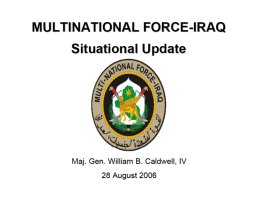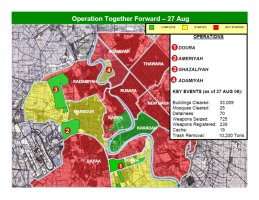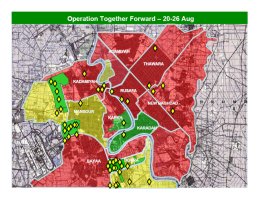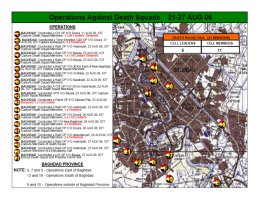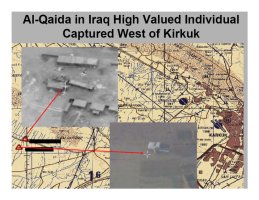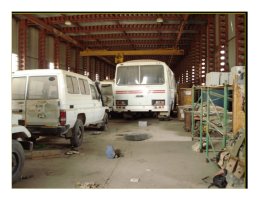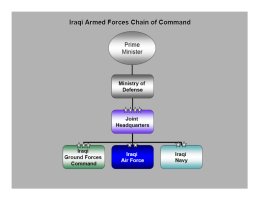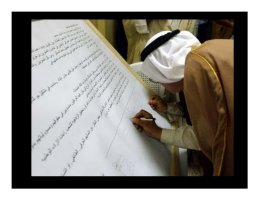
Press Briefing, Aug. 28, 2006
Multi-National Force-Iraq
Sunday, 27 August 2006
Maj. Gen. William B. Caldwell, IV
Senior Spokesman, MNF-I
BRIEFING BY MAJOR GENERAL WILLIAM CALDWELL, SPOKESMAN, MULTINATIONAL FORCE IRAQ TOPIC: OPERATIONAL UPDATE LOCATION: THE COMBINED PRESS INFORMATION CENTER, BAGHDAD, IRAQ TIME: 9:00 A.M. EDT DATE: MONDAY, AUGUST 28, 2006
GEN. CALDWELL: Good afternoon, ladies and gentlemen.
Iraqi security forces, supported by coalition forces, are continuing operations across Iraq. A particularly focused effort continues in Baghdad, and we're seeing signs of progress. We've reduced the level of violence from the July levels, but we must remain vigilant and continue to work diligently at the local level. The real measurement of accomplishment will be the long-term stability we all establish here in Iraq.
We're seeing progress towards reducing the number of kidnappings, murders and sectarian violence in areas in which we're operating. Attacks within the Baghdad province averaged about 23 attacks per day over the past week, which is lower than the monthly average for July. The average daily murder rate in Baghdad province has dropped 46 percent from July to August. And if you look to just the past few weeks, from the 7th through the 25th of August, the murder rate has dropped 50 percent over the daily rate for July.
Vehicle-borne improvised explosive device -- devices decreased by 50 percent last week, for a total of eight, which was the lowest monthly average in almost eight months. And of course we've seen that recent spike, though, in the last 48 hours.
However, as we know, the insurgents and terrorists are punching back. It's an attempt on their part to offset the successes the Iraqi government and its security forces have made here, and divert media attention from the accomplishments of the Baghdad security plan, especially as it's being told by the Iraqi citizen on the street.
Slide and chart, please.
Since August 7th, Iraqi security forces, with coalition forces assisting, have focused security operations, as we've talked before, in the three beladiyas down here of Dura, Mansour and up in Kadhimiya.
Over the weekend, combined operations also began up here in Adhamiya. As you can see right there, in this little area right here is where operations have begun.
And again, utilizing the chart, complete is in green, and yellow means it's operations which have -- are ongoing, as you see right here.
Operations up there in Adhamiya began by establishing a cordon around that specific area. And then over the weekend a driving ban was implemented, and Iraqi security forces started conducting a civil census, weapons and vehicle registration, building searches and meeting with local leaders.
Combined operations in Adhamiya are led by the soldiers of the 1st Brigade of the 9th Iraqi Army Division and the 2nd Brigade of the 6th Iraqi Army Division, supported by the Iraqi National Police 1st Brigade, 1st National Police Division and soldiers from the 172nd Stryker Brigade Combat Team.
Part of this brigade combat team is -- has within it the newly arrived 1st Battalion of the 26th Infantry Task Force, which has arrived from Germany. As the lead elements of the 2nd Brigade, 1st Infantry Division, this task force deployed into Iraq from Germany on August 15th as part of a validation to demonstrate the capability to rapidly deploy units from their home bases to Iraq on a very short notice. The task force was alert (sic) on August 2nd, began its deployment by air from Germany to Kuwait.
Immediately upon arrival, these soldiers were issued heavy equipment from prepositioned stocks within Kuwait, conducted mission preparation and began moving into Iraq to provide further support to the ongoing Iraqi security force operations. What's significant here is the demonstration of that rapid deployment capability that was just executed.
Within the ongoing operations, the Iraqi security forces, with coalition forces in support, as of August 27th have cleared over 33,000 buildings, resulting in 19 caches found and more than 700 weapons seized and 70 persons being detained. While we're seeing very positive progress, I'd like to point out that the insurgents continue to target these beladiyas in which we're operating.
Let me take you through a seven-day period from August 20th through 26th to show you the areas in which we've experienced multiple attacks.
Slide and chart, please.
As we discussed before, these are the primary beladiyas in which we've been operating, down here in Dura, Mansour and up here in Kadhimiya. And as you notice during that seven-day period, we have not tried to differentiate what kind of attacks occurred, but some sort of attack did occur during those time periods, whether it had been small arms fire, indirect fires, kidnapping or murder or something else. But you can see, there is a predominant amount of them located in the beladiyas upon which we've been operating.
These slides will show that the insurgents and terrorists are attacking where we've made gains in order to thwart the successes of the Iraqi security forces and further discredit the government of Iraq. Their methods are simple: attack innocent Iraqis. They want to inflict as many casualties as possible on the innocent civilians of Iraq and of the Baghdad security forces. Also, because of the effectiveness of attacks have been reduced, the insurgents and terrorists have been seeking dramatic attacks in other areas, as evidenced by the vehicle-borne improvised explosive devices we've seen executed both yesterday and today within the Baghdad area.
Although the focus areas are not free of any and all violence, we have reduced the amount of violence, and we're working to set the conditions so the Iraqi leadership and local citizens can revitalize those communities. But it's just not the statistics that show progress. We're actually seeing progress out there. An interesting sign of progress that has recently been relayed to me is there have been an unusual number of weddings in the streets of Baghdad recently. When the local Iraqis were asked why, they responded it's because they feel as if the security is improving within their city.
Whether it's shops opening, banks opening, neighborhood (traps ?) being removed, women and children moving about in their neighborhoods or young people getting married in public, the Iraqi security forces are making progress. But together, we still have a lot of work to do.
Slide and chart, please.
Our fight in Baghdad is not only against the insurgents, but continues to be against the death squads. From August 21st through the 27th, Iraqi security forces and coalition forces have taken down five cell leaders and 11 cell members.
There was 21 attacks, raids, operations that were conducted over that seven-day period; 19 of them specifically focused in the Baghdad area; five of them, as reflected here, were just outside of the Baghdad city proper but within the Baghdad province. Of these operations that were conducted within inside of Baghdad city proper -- you can see the locations predominantly down here on the southwest side, and up here, where we're now conducting operations as of this weekend.
All these were intel-driven raids based upon fusion of intel from various sources. Conducted -- not all resulting in the detention or capture of an Iraqi or foreign cell fighter who was operating as a death squad member. As you can see here, whenever you see a red, that indicates that a person was detained of value that was in fact a focused effort. If you see nothing, that means the raid was conducted, but that in fact the person in question was not found or apprehended at that location. But those are the operations that were conducted over the last seven days.
So the intensity and the vigilance upon which they're going after sectarian violence here within Baghdad continues with these, as you can see, 19 specific operations conducted within the Baghdad province over the last seven days.
I'd like to talk to you a little bit about al Qaeda. Iraqi security forces and coalition forces in support continue to have success in the systematic disruption and disorganization of the al Qaeda in Iraq network. Throughout the month of August, Iraqi security forces and coalition forces targeted, killed and captured mid- to high-level leadership and disrupted foreign terrorist facilitation networks. Operations included over 140 assaults resulting in 17 terrorists being killed, five wounded and over 300 suspects being detained. Each action removed foreign terrorists or insurgents from the fight and contributed to the development of a safe and sovereign Iraq.
Slide and chart, please.
One of the most significant operations took place on August 19th near Kirkuk, and resulted in the capture of a Kurdish bombmaker suspected of orchestrating some of the most horrific bombing attacks we have seen here in Iraq. He is considered to be an explosive expert who produces suicide vests and provides explosive devices and remote control detonation devices. He's also known to have facilitated the movement of high-level al Qaeda leaders in Iraq. This slide depicts the map upon where the raid was conducted. This is the city of Kirkuk right over here; just to the west of it is where the operation took place, right here. The specific location that was targeted was here, and then, of course, the detention operations that continued there. Five suspected terrorists were killed during this operation that was conducted on the 19th of August, along with five more being detained.
Intelligence does indicate that the captured terrorist was also involved in the bombing of a Kurdish political party headquarters in Mosul on August 15th.
Slide, please.
On August 23rd, coalition forces found two men bound and gagged in a shipping container in the area just south of Baghdad. The men told the forces that were held there for almost two days by a group of terrorists who were intent on eventually killing them. As these forces continued clearing the area, they captured a terrorist, who, upon questioning, provided information that led to a building that contained a large amount of plastic explosives and numerous commercial vehicles, which are depicted in this slide here. And as it turned out, each of these vehicles were being rigged and had spaces within what they were going to be used for vehicle-improved explosive devices.
After securing the area, an air strike was called in, and the suspected vehicle-improvised explosive device factory here was destroyed. Seven large secondary explosions were noted after the initial bombs were dropped on the target, indicating the presence of explosive material within the structure.
We do realize that al Qaeda in Iraq is the primary instigator of sectarian violence here. Terrorists captured during these and other operations continue to provide actionable intelligence upon -- (inaudible) -- Iraqi security forces and coalition forces continue operations within Iraq.
As we continue to make progress towards defeating insurgents and terrorists, we're doing so because of the fact that the Iraqi security forces are in fact taking the lead more each and every day. Over the past three years, the Iraqi army has been rebuilt from the ground up as a modern and effective fighting force. Iraqi army divisions have fought alongside coalition forces under commander of the Multinational Corps Iraq. During this time, coalition forces have been working to train the Iraqi military to eventually conduct independent operations. This modern Iraqi army consists, as we know, of 10 divisions and approximately today 115,000 soldiers.
Of the 10 Iraqi army divisions, five headquarters have already assumed security lead for their area of responsibility. This last assumption of lead included the 4th Iraqi Division on August 8th.
Slide and chart, please.
In early September, the Iraqi Ministry of Defense, through the Iraqi joint headquarters here -- so we'll go from the prime minister to the minister of Defense down to the joint headquarters -- will assume operational control of the Iraqi ground forces command, the Iraqi air force and the Iraqi navy. This is a significant step in the Iraq path to self-reliance and security. What this means is that the Iraqi Ministry of Defense is prepared to begin assuming direct operational control over Iraq's armed forces.
This significant event will mark a new chapter in their history as it forms the basis for a joint force capable of protecting its people and preserving peace here within Iraq. When this occurs in early September, operational control of Iraqi military forces will be transferred to the Iraqi joint headquarters. Upon stand-up of the Iraqi ground forces command, the majority of Iraqi divisions will remain under coalition forces initially and then be gradually transitioned into the Iraqi ground forces command.
We anticipate this command will take several months, this transition. So when this command is stood up, early sometime in September at a date to be determined by the prime minister, and this command stands up, then the divisions, the 10 Iraqi divisions will eventually all come out of the direct operational control of the prime minister in his function as commander in chief of the armed forces of Iraq.
While the military structure continues to evolve and grow, we're seeing political changes taking place too. Recently Iraqi leaders at both local and national level met to (foment ?) unity and encourage diverse groups to interact peacefully. On August 20th in Hillah, officials from Iraqi security forces, national and local governmental officials joined together with local civic, tribal and religious leaders to map out a strategic plan to shape a peaceful future for Babil.
Slide, please.
What you see here is a tribal sheikh signing an oath. It was an oath in which they pledged to work together hand in hand with other leaders from the province regardless of religion or affiliation. This reconciliation conference was organized by the Babil provincial police chief, Major General Das Hamza (ph). And just this weekend here in Baghdad itself, several hundred tribal leaders from across Iraq met for the first of four meetings to discuss Prime Minister Maliki's national reconciliation objectives.
It's worth mentioning that the discussions that led -- that followed on after the meeting on Saturday, which continued on into Sunday, led to the establishment of four committees to address the topics of de-Ba'athification, counterterrorism, disbanding militias and holding dialogue with what they called the resistance groups, and building the security forces. These leaders came together despite their different interests and needs because they expressed the desire to work together towards an Iraqi future free from sectarian violence and senseless killing.
Iraqis need their leaders to move them forward towards a prosperous future. By signing a pact of honor, pledging to work together to stop sectarian strife, these tribal sheikhs are leading the way towards Iraqis choosing cooperation over revenge, and unity over hatred.
Violent extremists, on the other hand, have lashed out over this weekend against this very progress. On the same day that Iraqi tribal leaders vowed to cooperate to achieve peace, the extremists perpetrated attacks against innocent civilians and security forces both inside and outside of the Baghdad area in an attempt to ensure that government fails and the Iraqi people remain fractured.
Iraqi leaders on every level are seeking harmony while these violent extremists seek disunification and seek discord. But it'll be the Iraqi people who will decide their future, and it is them who can deny legitimacy to these extremists by working with their government towards unity, security and prosperity.
And with that, I'll be glad to take whatever questions you have.
Yes, ma'am.
Q Rebecca Santana from the Associated Press. There's reports this morning and late last night about fighting in Diwaniyah, and that 34 were killed, including, I believe, 25 Iraqi army soldiers. And I was trying to find out, first of all, whether any coalition forces have been involved in that. There's reports that they were called in late last night, and if you can give -- shed any light on that, and its fighting with the Mahdi Army. And if you can -- is this a reflection of their growing strength in that area, if you can comment on that as well.
GEN. CALDWELL: I am not at all familiar with that -- not to say that there isn't something going on. I would have get back to you, though. I was not briefed on that one this morning, did not hear about it, but I'll be glad to go back and double-check it, and we'll provide you whatever information we have available at this point.
Any other questions?
Yes, sir.
Q General --
STAFF: Let's wait for the microphone, please.
Q General, how do we know that this operation -- the operation you're doing now in Baghdad -- you know, we've seen many operations in the past where U.S. troops have come in, cleared an area, then left, left it to the Iraqi troops, and, you know, violence returns. I mean, what guarantee is there this time this won't -- we won't see the same pattern here in Baghdad this time?
GEN. CALDWELL: Obviously, what everybody is working towards this time is finding a more unified approach. It's not just a security operation, and that's the key aspect of this whole -- it's called Baghdad Security Plan. There may be a more appropriate term if we had called it the Baghdad Peaceful Coexistent Effort or something like that, because it's -- not only did the security forces go in and immediately establish a clearing operation and then provide protection, it's that build phase, that third part of it that's going to be so critical. And that's the part that perhaps we've not as executed as (violently ?) or as integrated as we are attempting to do this time than we have done in the past.
I mean, as late as last night, I sat in on a meeting with the acting ambassador from the embassy along with the provincial chairman from the Baghdad Council, the governor from Baghdad, several other members from the committee there along with the key Iraqi officials as everybody continued discussing the build phase for Baghdad. It wasn't about the security. It wasn't about military operations that were being conducted, but rather what are the projects, what are the job opportunities that we're going to help develop, what are the economic incentives that we're going to put into the city to help revitalize that and give people back jobs and work on the basic services that you keep hearing about from every citizen that they want restored back into the Baghdad area.
Q What about this issue of confidence in --
STAFF: Microphone, please. Microphone, please.
Q What about this issue of confidence in the Iraqi security forces?
GEN. CALDWELL: Well --
Q And a lack of -- I mean, the fact that we went through a period a year or two ago where everything was -- all the American troops were pulled out of Baghdad, Iraqi forces went in. Evidently, that didn't work, and now you're putting American forces back into these neighborhoods. I mean, who's to say it's just not a cycle that just continues?
GEN. CALDWELL: Well, I think what you're -- if you go down and watch one of these operations -- which we've made very open to the press to come and observe -- you'll find that coalition forces are really providing the outer security, and it's the Iraqi security forces themselves that are actually doing the clearing operations and most of the interaction with the local government officials, whether it's the neighborhood advisory council or the district advisory council. I mean, we are there in support of them, but truly this is an Iraqi-led effort down there.
But the next thing you're seeing is you -- we've gone into the national police. There's a Quick-Look project going on right now, where they're going into each of the 27 battalions and doing an assessment both with the leadership, the training, the organization and the commitment of these national police, and making assessments on them whether we have the right leaders in the right positions and going back and making whatever adjustments or modifications are made to those battalions. And then, I know once the Quick-Looks are completed some time in late September, the prime minister has been working on a plan where they're going to then take an entire police brigade at a time and move it to a location and put it back through a refresher training.
I think everybody's got to remember both the Iraqi police and the Iraqi army are about three years old at the most, and any new organization is going to through growing pains. And they have challenges all the time ahead of them that they're going to have to keep readdressing. We have been in existence for over 200 years in our Army, and our police forces have been in existence for just as long. They've got about three years under their belts right now, and so it's going to take time to continue developing them. But there's tremendous of the -- if you go look at the statistical data that -- what the Iraqi citizens say about the Iraqi army, it's on an upward turn in terms of their confidence and their reliability they express in the Iraqi army and the Iraqi police. We continue to work diligently with the Iraqi government to help in that respect to develop the same kind of feeling about them too.
Yes, sir.
Q (Name inaudible) -- from AFP. In the last few days, attacks in the north, especially Kirkuk, on the Kurdish community people have increased. Are you preparing a plan to kind of boost the security forces there, anticipating a lot of -- you know, the whole issue of Kirkuk is going to be discussed again a couple of months down the line, because both the Arabs and the Kurds claim ownership on that city, and the whole issue of the constitution thing coming to a review.
What do you think of it? Is there a plan which could see that, you know, attacks don't increase in Kirkuk at a time when you already have a lot of problem in Baghdad? I mean, is there any plan to look at Kirkuk in a different way now? GEN. CALDWELL: I think that the prime minister has talked extensively about Kirkuk. There's about six or seven party areas that are discussed quite often at the Ministerial Committee for National Security, the MCNS. I know that is specifically one of those in which he's working very diligently, looking at a political solution, while maintaining security in the area. But I'd really have to defer back to the government of Iraq to let you talk -- let them talk about the specifics on that plan.
But in fact, there is a -- quite a bit of discussion going on with respect to Kirkuk. I know that.
Yes, sir.
Q Solomon Moore, LA Times. I wanted to just ask you about the military's specific strategy for dealing with the militias. I know that the Baghdad security plan, one of the objectives was to deal with militia-affiliated death squads, and I'm wondering how you're actually going about that and whether you're having to change your tactics somewhat depending on which militia we're talking about, Badr or Madhi Army.
GEN. CALDWELL: Solomon, I -- as we keep stating and you'll hear it if you go all the way down and talk to the brigade and battalion- level pact commanders, both the Iraqi army and coalition forces, we are targeting those people who are operating outside of the law.
It's not a specific organization or a specific group of people, but it is specifically anybody who's operating outside of the law.
Everything you saw in those death squads, those 19 operations that we conducted, were all intel-driven about somebody who was involved in fact in extrajudicial killings or death squads out there operating on the extreme element.
But it had nothing to do with any particular organization. So we're not taking on -- dealing with a particular organization. The government of Iraq may have some of their own plans, and we've heard the prime minister talk about that. But as far as the coalition forces go and the operations we conduct, it's after anybody who's operating outside of the law.
Q Okay. So is there no strategy for militia-affiliated death squads, or is that -- I mean, is the feeling that that's not an issue?
GEN. CALDWELL: If there is a death squad element out there operating, we're targeting it. We don't care who it's affiliated with or says they are or are not affiliated with. Makes no difference to us. If you are a death squad element and you're operating out there, we're coming after you.
And in fact, you can see, I mean, we're executing about three to four operations every single night, based on actual intelligence within the city of Baghdad. And we're going to continue with that pace. There are forces that have been specifically designated, with support elements specifically designated, to conduct just that operations and just within Baghdad itself.
Q Okay. I mean, the question I'm asking --
STAFF: And -- but -- one follow-up, please. Go ahead.
Q Okay. But is there any political element to the strategy? I mean, you know, what we've been hearing is that there have been death squad linked to specific militia groups. And I'm wondering: Are you dealing with those -- that command and control element at all, or have you found that command and control element?
GEN. CALDWELL: It's probably a two-pronged approach that is going on down in the city. There's one which is the political aspects, which the government of the Iraq -- the prime minister himself very much involved and talks about it -- about how he, the prime minister, is dealing with groups like militias and all that.
As far as coalition forces go, our focus and effort is on anybody operating outside of the law. And if we can find the command structure that's out there, that's operating outside of the law, we're going to target that, and we have done so.
You know, as we tried to show here on the slide, it's not just cell members. There was 11 cell members picked up this last week. But there's five cell leaders, and those in fact were key command and control elements that -- within the city, they were directing not only one or two but perhaps multiple groups that were out there conducting death squad activities.
Yes, ma'am?
Q (Through interpreter.) (Off mike) -- three attacks on the multinational forces and Iraq security.
GEN. CALDWELL: Similar to the question that Solomon asked, I think it's -- what are we doing about groups that are out there that are conducting illegal activities? And in fact if we find groups operating outside of the law, that's who we're specifically targeting, going after, with priority being upon those who are operating death squad activities, the extremists on both sides, both the Sunni and the Shi'a side, who are conducting sectarian violence out there within the city.
There has been, perhaps, as we have seen just in the last couple days, more of an effort to target some of the activities against Iraqi security forces.
We have seen that, we're watching it closely, but there's not necessarily somebody that's directly attributable to other than, again, just what we consider to be the terrorist elements that are out there within the city; those who wish to discredit the government, those who wish to show that the government is, quote-unquote, "challenged" in providing the security to the people here in Iraq.
STAFF: Please turn off your cell phones. They interfere with the sound system. All the way -- (off mike).
GEN. CALDWELL: Yes, sir?
Q Al-Sabah. (In Arabic.)
GEN. CALDWELL: The question I was asked, have we seen an improvement in the Iraqi security forces, both the police and in the army. And the answer to that very question is yes, we have. And we have seen it notably in the Iraqi army forces. They continue to conduct operations at a larger level with a greater command and control, (span of ?) of command and control, from both the initial planning, to the preparations through the actual execution of these operations.
We see that each and every day we continue operating with them, especially within the city but also with outside -- in all of Iraq itself. As you know, 10 of the divisions currently today come under the command and control structure of the Multinational Corps, but as we stated here, in early September we'll see a change in that. And when they stand up the joint headquarters and the Iraqi ground forces command headquarters, the prime minister will decide how many divisions and how rapidly they're going to take and put under the direct command and control of him in his responsibilities as commander of the armed forces of Iraq.
So that's able to be done because of the very fact that the Iraqi army is, in fact, becoming more capable each and every day. Obviously, we still have a long ways to go with things like logistics and sustainment, but we do see their capability is growing all the time. And as we talked about with the national police, we've got a quick-look program in place, they're going to go through that over the next two months, and adjustments will be made based on those outcomes, and then they've got a retraining program for each of the brigades scheduled that will then be conducted thereafter for several months. Yes, sir?
Q Scott Johnson from News Week. I'm just wondering, can you go into a little bit more detail on what's supposed to happen after the U.S. component of Operation Forward Together? In other words, who and when -- who's going to take over and when? Can you go into more detail on that?
And the second part of that question is, if the Iraqi police are supposed to be a big component, can you talk about any U.S. oversight measures as part of that quick-look program? I mean, are there any U.S., American advisers looking at -- involved in that quick-look program, or is that a purely Iraqi process?
GEN. CALDWELL: To start with, I might put in perspective for you as part of Operation Together Forward what we did this month. We took and brought in five additional U.S. military police companies, each of about 180 soldiers, and brought them into the city with three of them specifically targeted to be embedded with the Iraqi police units, and the other two with the police stations. There's about a hundred Iraqi police stations generally within the city. The intent is by setting up these military police training teams they'll be embedded with all the Iraqi police units now all the way down to the police stations themselves.
We did not have that full coverage like that prior to the beginning of this operation. We do now, to establish that direct mentorship, training, guidance and oversight for all those police units within the city.
We then also redirected some of our international police observers that were coming into country into the Baghdad area too. Right now there's about 700 of them operating within the city, of an increase of about 150 than what we had before. Again, trying to provide some more additional oversight for the Iraqi police forces, both local and national police forces.
So that's been one of the major additions as part of Iraq Operation Together Forward here that we're doing that began in the month of August. And we're already seeing some tremendous feedback in talking to our military police training teams out there and hearing what they're having to say in terms of what they've been able to already accomplish.
As far as the follow-on phase and what the intent there is, again, we go in, we clear an area, we then ensure it has protection in the area, and then we continue with the build-up phase. And that protection to allow the Iraqi army forces and coalition forces to move further away from there requires the police forces to be stood up operational and capable. And that quick look does have a combined effect, both with Iraqi forces and coalition forces working together there, as they go in and do those assessments. And those will all be conditions-based, how quickly they can move out of specific areas and turn it back over to the local police, with national police in support, to continue to provide the protection in those specific areas.
Yes, sir?
Q (Through interpreter.) (Off mike) -- be able to resolve the issue?
GEN. CALDWELL: As far as the question goes, part of the whole process of this quick-look is going in and seeing and ensuring that each of the police forces, each police member, has an oath in allegiance to the country of Iraq and not to some other group or organization -- key integral requirement. And during that vetting process that's going on with each of these battalions as they go back in and look at them, if they in fact find members who are unable to give their complete loyalty and responsibility back to the government of Iraq, then they're going to be removed from their positions. So if they find that their allegiance is someplace else, they will no longer be part of the police force. And that's a very deliberate vetting process that's being redone in each of the police forces.
Yes, ma'am?
Q General, Ellen Knickmeyer with The Washington Post. Operation Together Forward has hit most of the trouble-spot neighborhoods of Baghdad, Dura and Amiriyah and Ghazalia and, I think, other neighborhoods. But one that it hasn't gone into is Sadr City, where the Iraqi army says it finds many bodies every day from violence. Why -- is there going to be -- is Operation Together Forward going to go into Sadr City? And if not, what's the rationale behind exempting it from the operation?
GEN. CALDWELL: As the prime minister laid out Operation Together Forward, the intent was -- his intent is for Iraqi security forces to operate throughout the entire city of Baghdad, with focused initial efforts on specific portions. There are some other specific focus areas I know the prime minister's still looking at, that will be taken on first. Wherever those are, he'll announce those and give us the timetable for execution of those. There's a lot of planning that's going on already, and those areas are already being looked at.
But the prime minister has stated that this plan is for all of Baghdad City and that the intent is to in fact have Iraqi security forces, both police and Iraqi army forces, operating throughout the city of Baghdad.
Q So that Operation Together Forward will go into Sadr City?
GEN. CALDWELL: The -- to answer that specifically, the prime minister stated that the operation will be conducted throughout the entire city of Baghdad. That is correct.
Yes, sir?
Q There are two months in the security plan, both -- the security operation Together Forward. The last two days have been extremely high -- high rate of bloodshed in Baghdad, as well as across Iraq. Do you believe that you are achieving the results from Operation Together (sic) that you really wanted to accomplish when you started the operation, number one? That's one question focus for Baghdad operation.
Two is, could you give some more details on the al Qaeda Kurdish high individual which you -- high-value individual which you've caught in Kirkuk, near Kirkuk? Is he really -- is he close enough to al- Masri and that kind of command chain in the network, terror group network?
And third is if you could explain the last chart again, the last armed forces chart, what exactly --
GEN. CALDWELL: Oh, how that works?
Q Yes, how that works.
GEN. CALDWELL: All right.
As far as are we achieving our objectives in Operation Together Forward, we are, in fact. But I think what's very important to realize -- from the very beginning, we have always stated, this is not an operation that's going to be conducted over several weeks. This thing's going to be conducted over many months, and the idea was to get into focused areas, reduce the level of violence initially in specific focus areas, bring down the levels of kidnappings, murders, death squad operations, and bring back some normalcy to those neighborhoods -- specifically within Baghdad -- that have experienced the greatest level of violence up till now. In each of those areas where we're operating, we in fact are being very successful in doing that.
We have anticipated from the very beginning of trying to be very realistic about realizing that there will be a point where these extremist elements are going to do whatever they can to discredit the ongoing operations. And when you look at where some of their attacks have occurred over the last, you know, week, those are all in the beladiyas, not in the specific objective area, but in the beladiyas, where in fact we're having -- the Iraqi security forces are having very successful operations in bringing back normalcy to those towns.
So to answer your question, yes, the operation is moving along as anticipated. It was always expected that there would be this extremist element that would get out and try to discredit the operations that are ongoing by striking at areas where civilians are readily available, where they can inflict some casualties. We'll continue to make every diligent effort to preclude that from happening. Obviously, nobody wants to see any innocent Iraqi civilian needlessly lose their life to some violent activity like that.
So -- the operation, though, is something that will be done over many, many months. Those who are expecting it to happen overnight and then we're done is not the case. This is the beginning of a long partnership that will occur in the city of Baghdad. We're at the beginning of it. We have a long ways to go, but all the signs are very positive in terms of what is occurring in those specific areas, those specific neighborhoods where the operations have been conducted.
As far as that terrorist that was picked up, we are trying to get more information declassified. What I've provided today was all so far that they've made available to us to release, but as soon as we can make more information available, we in fact will do that.
Q (Off mike.)
GEN. CALDWELL: Yes. And he very much has -- he's a very significant, high-level member. We do in fact know that he had fairly close contacts to AAM; but the level and the degree of contacts still not --
Q But he's Iraqi?
GEN. CALDWELL: He is an Iraqi, yes, that is correct.
Okay.
Q (Off mike.)
GEN. CALDWELL: Yeah. Just to explain this one more time to make sure (we're straight, then ?) -- the prime minister then functions and serves as the commander in chief of the armed forces for the government of Iraq. That's his other hat he wears, just like the president of the United States does for us as our commander in chief.
Then the minister of Defense is directly responsible to him, and under him are all the armed forces of the country. The first headquarters that he's going to have that's going to take control of that is what he's calling these joint headquarters right here.
And then underneath him, he's establishing the Iraqi Ground Forces Command, IGFC, which, underneath him, will have the 10 Iraqi army divisions. He's indicated that he'll move them gradually. Underneath, there is -- that command structure assumes greater command and control, demonstrates its ability to handle increased reporting requirements and responsiveness and everything else. And then we'll continue supporting the Iraqi Ground Forces Command Headquarters however he so directs.
But what's most critical to understand is today all 10 of those divisions report up through the Multinational Corps commander, the coalition forces commander of the Multinational Corps-Iraq.
When this structure stands up in early September, and the prime minister so directs those divisions who no longer have any reporting requirements or responsibility through the coalition forces, they'll be all directly from there all the way up to the prime minister.
Q But does that mean that -- (off mike) -- officially -- (off mike)?
GEN. CALDWELL: I would tell you he is to me already, but you're exactly correct. He is -- there will be absolutely no coalition forces in that chain of command whatsoever. That is correct. And that's why that is so significant. That'll be the first time that has occurred in over three years, where we're starting to see that. And then, his intent, I think, as he has expressed, is he sees them demonstrate the capability to exercise that command and control to move more of these Iraqi army in the lead divisions underneath that headquarters.
MODERATOR: We have time for two more questions.
GEN. CALDWELL: Yes, sir.
Q (In Arabic.)
GEN. CALDWELL: The question was, can I provide some specifics on the areas of which we've conducted operations, like in Dura and Ghazalia and Amiriyah?
What I can tell you is there has been a -- in those specific areas, a dramatic reduction. As we stated, as we start off, you know, we've just -- even within the Baghdad province, because of the ongoing operations, you know, attacks have dropped to about 23 a day, a significant reduction just seen from last month, but also down from previous months. We also know that the murder rate within Baghdad, you know, dropped 46 percent from July to August; again, another significant drop in reduction. But it's even greater in those three specific areas, and now, the fourth one we'll see over the next week, how that one goes. But in the three areas where we've already operated -- if you can throw back up the very first chart from today, if you wouldn't mind, please. As you look up here on this, down in Dura, Mansour and Kadhimiya, again, these are Ghazalia and Amiriyah, and where we're operating -- even talking recently with the DAC down in those areas, I mean, they will tell you, they see stores opening that have not been open for, you know, for up to two years. They relate stories about down in Dura how there is a bank that hasn't been open for over two years that's now back and operational. I mean, they'll share many great stories with you when you go into three areas. I've walked in all three areas over the last 10 days. You can freely move from there on foot without any fear of being hurt or any kind of intimidation occurring on you. I mean, the citizens truly are coming back in and taking back control of their towns, of their neighborhoods. You see kids out on bicycles. I mean, it -- you know, there was a person here last week, a reporter that related his own personal experience within Dura and how he was able to move through that city very freely and rode on a bicycle. I mean, he shared a little, like, personal testimony about what he saw.
So I mean, that's really the true measurement. The division has been great -- the coalition forces and the Iraqi security forces -- about helping any press person who would like to go into those areas to look around, talk to local residents. That's the true measure of success. Go down and ask the residents themselves how they feel about what's going on. They'll tell you the challenges; they're still waiting for the basic services to get fixed. They want to still see more electricity, still want to see more gas. They want to see the gas lines go down. The government of Iraq has taken some very deliberate steps to address those issues.
But as far as the security aspects go of it, they feel that being reestablished within those areas. And that's the first step towards going towards prosperity.
STAFF: Time for one last question.
GEN. CALDWELL: Back there.
Q Just to follow up a little bit on what Ellen said. You had said that the entire city of Baghdad will go through this operation at some point. There is evidence of bodies in Sadr City. There's also evidence of Mahdi Army being active in other parts of the country. Have you requested from the prime minister the right to go into Sadr City to clear this area? And what has been the response, if you have asked? And if you haven't asked, why haven't you asked to go into that area, when it's clearly a problem area?
GEN. CALDWELL: The Baghdad security plan operation took -- has focused on the areas where there are the greatest numbers of kidnappings, murders that were going on within the city. And so far, the three greatest areas that had the highest numbers of incidents, Iraqi security forces, with coalition forces in support, have moved into and are currently operating.
The intent always was stated by the prime minister to take on the most difficult neighborhoods first and we'll continue expanding from there. He's doing an assessment as we move along. There is no set timetable. It's all, as you hear, conditions driven. That's exactly as it is. The prime minister is directing the movement, how rapidly this operation will continue throughout the city.
You can see in certain areas like this here there has not been a deliberate operation in there per se, but in fact operations are ongoing in there. This is the only area that's been specifically cleared, up in this area, and you'll see those colors expanding out throughout the city of Baghdad eventually.
But the prime minister is completely in charge of this operation. He sits down and he talks weekly with the Ministerial Committee for National Security. They make those determinations. There's a lot of ongoing planning that's being done by the Iraqi security forces, with us in support, looking at next areas that everybody might operate in, what forces are available, how quickly are the police forces moving up to the responsibility and the capability to provide that protection, that are then allowed to (build phase ?), to continue. So it will continue being conditions based.
And that's the reason we keep saying this is many, many months in the execution phase; not something that's going to be done over the next four to six, eight weeks, but in fact many months will pass before this operation is complete, well into probably the beginning of next year.
STAFF: (Off mike.)
GEN. CALDWELL: Okay.
Thank you very much.
END.
|
NEWSLETTER
|
| Join the GlobalSecurity.org mailing list |
|
|
|


